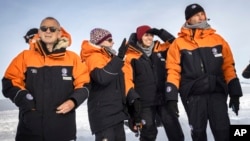New Zealand Prime Minister Jacinda Ardern appeared awestruck Thursday to be standing in the Antarctic hut of explorer Ernest Shackleton.
“I think when you’re a kid and you read stories about Shackleton, you’d never imagine you’d have the opportunity to come. So, I feel pretty lucky,” she said from inside the hut that was built more than a century ago. “It’s a cool place.”
Ardern this week is making a rare visit by a world leader to Antarctica, to see firsthand the research taking place on global warming and to mark the 65th anniversary of New Zealand’s Scott Base, which will be demolished in a few years to make way for a rebuild.
Ardern’s visit comes as delegations from 26 nations and the European Union meet in Australia to decide the future of Antarctica’s pristine waters.
Conservationists say new marine protected areas and rules to prevent overfishing in Antarctica are desperately needed, but that Russia could use its veto-like powers to once again block progress.
Russia last year rejected the toothfish catch limits proposed by the commission’s scientists, and the U.S. says this year that Russia and China have been blocking progress on creating new marine protected areas, although the U.S. aims to work toward a resolution with China. The motivation for Russia, which did not respond to requests for comment this week, remains unclear.
Ardern’s trip has highlighted some of the challenges of visiting the icy continent. Her first flight in a military cargo plane was turned around after about two hours on Tuesday due to strong winds and deteriorating weather, making her part of what’s informally known as the “boomerang club.”
She made it to Antarctica the next day, accompanied by a single pool journalist whose photos and videos can take many hours to transmit overnight due to the tenuous internet capacity. She is due to return home Saturday.
Ardern said the scientists and crew on Antarctica have noticed the effects of global warming over the past five years, including observing sea ice cracking and moving, and glaciers and icebergs changing.
She said it was important for New Zealand to maintain a leadership role on the continent.
“We’re in a period where internationally you see that parts of the world are becoming increasingly contested, and Antarctica is part of that, too,” Ardern said.
Standing in the hut, Ardern said that Irish-born Shackleton and his British expedition had tried to reach the South Pole, but that he was remembered more for his extraordinary leadership and saving the lives of his men. She said she didn’t exactly draw parallels with her own leadership.
“I don’t think I can quite compare government with the hardship and endurance of Antarctic exploration,” she said, adding with a laugh: “But some days.”
New Zealand Leader Ardern Makes Rare Trip to Antarctica
update

WELLINGTON —



